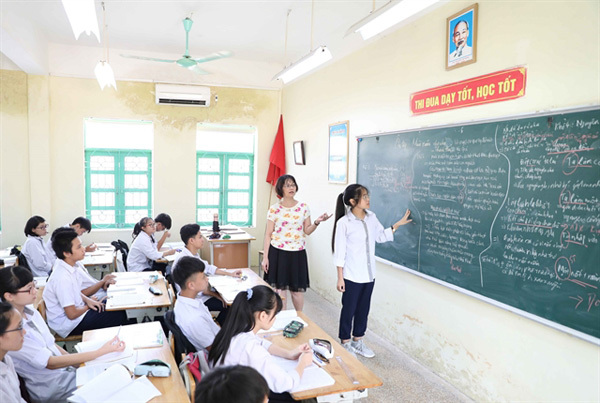 |
|
A literature class at Duong Xa Secondary High School in Gia Lam District, Hanoi.
|
One of the newest changes in the 2019 Law on Education is to waive tuition fees for secondary high school and kindergarten students under five years old, in a staggered roadmap. Can you tell us more about the education ministry’s vision for this roadmap?
Waiving tuition fees for secondary school students and kindergarten students under five years old to boost general education to a wider population is a major policy by the Party and the State, showing the attention to promoting the education level in the country, especially in remote and economically challenged areas, or regions dominated by ethnic minority groups.
However, as tuition fee exemptions will certainly have a great impact on State budget expenditure if the policy is rolled out immediately, the State’s capacity to balance the budget might be undermined.
Therefore, the Government issued Resolution No 104/NQ-CP on August 8, 2018, in which it agreed on tuition waivers for preschool children under age five and secondary high school students but the implementation will be in phases, with the current priorities on exempting tuition fees for five-year-olds and lower secondary schools in disadvantaged areas, ethnic minority people and remote areas.
What are the estimated costs for this policy?
The Ministry of Education and Training has worked with concerned agencies and ministries to explore the impacts of the tuition waiving policy on the State budget. We found the State will have to spend an additional VND1.378 trillion (US$59.5 million) a year if the pre-schoolers under five years old no longer have to pay tuition fees, and an additional VND2.143 trillion ($92.4 million) a year for secondary highschoolers.
A staggered roadmap is even more relevant now that State budget collection has been severely hurt by the COVID-19 pandemic, and the education ministry is working with the finance ministry to submit to the central Government a reasonable plan given the new development.
Another item in the new education law is to give provincial or municipal People’s Committees the authority to select textbooks instead of deferring to education institutions like in the case of the first-grade curriculum for the 2020-21 school year. How has the education ministry prepared for the change?
The education ministry issued a draft circular in mid-May providing guidelines on the new policy.
Per this draft circular, provincial and municipal People’s Committees will set up separate councils for each subject of an education level to advise the committee on textbook selection decisions. The members of this council will include leaders and professionals from local education departments, active education managers and teachers from educational institutions in the locality. The council needs at least 15 members, two-thirds of whom must be working teachers or heads of schools’ faculties.
Many think that letting the education institutions deciding on what textbooks they use is a reasonable and practical policy. So what has the education ministry done to ensure that the voices of teachers and schools have substantial weight in the decision-making process?
The draft circular detailed a six-step process for the selection of textbooks.
First, the subject faculty from each school will research and discuss the merits of available textbooks. The teachers will cast a vote on one textbook for the subject of their profession, then they will report to the leaders of the schools on the list of the selected textbooks, with voting results included.
Next, the schools will research, discuss and evaluate the textbooks, with input from students and parents.
After this, schools will submit their choices with voting results to the local education department, which will inform the provincial or municipal People's Committee.
Therefore, although the provincial and municipal People's Committee has final authority to decide on textbook selection, teachers and schools still play a very important role. The decision of the teacher and educational institutions will influence the ultimate decision by their local governments. VNS

Education Ministry requires to collect suitable tuition fee for online teaching
In its document to people’s committees in cities and provinces yesterday, the Ministry of Education and Training required private-run schools to collect suitable tuition fee for online teaching during Covid-19 closure.

Textbook changes to shake up schools
Provincial Departments of Education and Training will soon decide what set of textbooks are used for first graders in their province.
 Deputy education minister Nguyen Huu Do talks on waiving tuition fees and textbook selection issues in the 2019 Law on Education.
Deputy education minister Nguyen Huu Do talks on waiving tuition fees and textbook selection issues in the 2019 Law on Education.